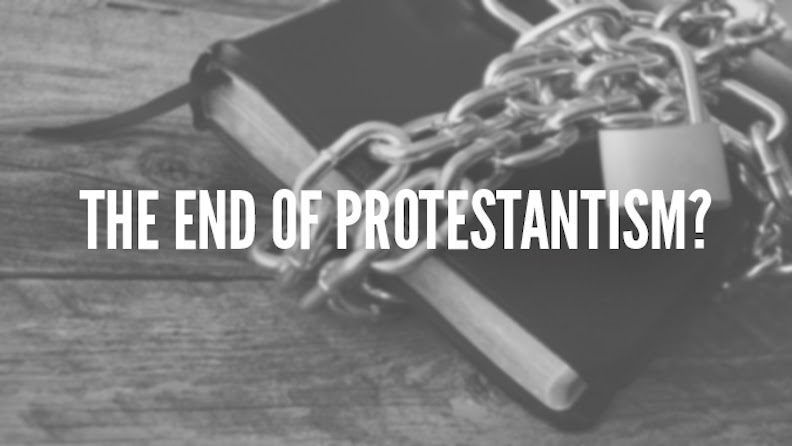
Protestantism is dead in Britain. It isn’t just the lack of church attendance. Britain no longer identifies as a protestant nation. Presbyterian and Methodist churches and even Salvation Army Citadels (those testaments to the virtues of teetotalism and evangelical assurance) are now second hand furniture shops, libraries and beer kitchens. Nonconformist chapels have all but disappeared, languishing, rotting and deserted where they haven’t been turned into something else.
In 1901 the city of Hull, long known as “pure and Protestant Hull,” had one of the highest churchgoing populations in the country and 115 places of Christian worship, most of them Nonconformist chapels. Now just 11 remain in use and Hull has the lowest level of churchgoing of any British locality.
It is those denominations that have been the bedrock of British Protestant identity that have declined most spectacularly in the last 60 years. The two national denominations, the Church of England and the Church of Scotland, have each lost 75 per cent of their membership over this period. Other historic traditional Protestant Churches that formed the backbone of the hugely important Nonconformist conscience – Methodists, Presbyterians and Congregationalists – have declined even more catastrophically.
By contrast, newer independent, evangelical and charismatic churches, post-denominational in outlook, twentieth century in origin and not tracing their roots from the Reformation, are enjoying spectacular growth. Catholicism has also proved resilient; there are almost certainly more Catholics than Anglicans in England, and more Catholics than Presbyterians in Scotland attending church on a Sunday morning. Protestantism has become an anachronistic if not a dirty word. Archbishop Justin Welby, a figure on the Evangelical wing of the Church of England, has said that he would prefer not to describe himself as a “Protestant.”
For 400 years Protestantism largely defined British identity, culture and self-awareness. In fact, “Britishness” was essentially a Protestant construct, as is the United Kingdom of Great Britain – England, Wales, Scotland and Northern Ireland – with these disparate nations having been forged together, as Linda Colley and others have shown, by a shared anti-Catholic sentiment.
The monarchy is an avowedly Protestant institution and it is no coincidence that the first act required of a new British sovereign is solemnly to profess his or her own Protestant faith and resolve to secure the Protestant succession to the throne. That may change. Alongside its fundamental constitutional importance, Protestantism has, of course, long been a dominant influence in British culture, politics and collective consciousness.
The start of the strange death of Protestant Britain can be dated to the late 1950s. The peak year of membership for both the Church of Scotland and the Church of England was as late as 1955. It was also the year when commercial television started, breaking the monopoly of the BBC, the great cultural embodiment of Protestant British identity.
If the late 1950s saw the beginning of the turning of the Protestant tide, the 1960s and subsequent decades saw it in clear retreat. The “New Morality was an approach that could hardly have been more different from the classic Protestant values. A nation known for thrift, reserve and temperance acquired a reputation for mounting personal debt and binge drinking.
Without the glue of Protestantism to hold it together, the United Kingdom showed increasing signs of breaking up. Britain’s Protestant legacy was swamped by a prevailing emphasis on image and instant gratification. The Book of Common Prayer has all but disappeared and is considered a historic relic. The Authorized King James Version has been supplanted by a host of new translations. And the latest edition of Hymns Ancient & Modern has removed the word “Hymns” from its title, to reflect the seemingly unstoppable march of worship songs and choruses.
No longer is there a visceral anti-Catholicism. There has been a loss of religious sensibilities. People are more judgmental and hypocritical. Something has gone with the demise of restraint, reserve, seriousness, thrift, temperance and rationalism. Brits are less tolerant, less committed to free speech and serious debate – and could the rise of false news and the post-truth era be consequences of the death of the Protestant mindset?
Britain and European Protestantism gave the spiritual aspect of the deadly wound to the Catholic Church during the Reformation, while Napoleon gave it the political side of the wound n 1798. Britain then gave the world a global empire based on protestant principles leading to the establishment of the American states and eventually the proclamation of the Three Angels Messages. The empire is gone, and now its protestant heritage has also gone. Could it now be time for a resurgent political Catholicism in Britain? And perhaps, correspondingly, at powerful latter-rain inspired presentation of the last message of warning to the world gone secular and irreligious?
“The Protestant churches of America, —and those of Europe as well,—so highly favored in receiving the blessings of the Reformation, failed to press forward in the path of reform. …The majority, like the Jews in Christ’s day or the papists in the time of Luther, were content to believe as their fathers had believed and to live as they had lived. Therefore, religion again degenerated into formalism; and errors and superstitions which would have been cast aside had the church continued to walk in the light of God’s word, were retained and cherished. Thus, the spirit inspired by the Reformation gradually died out, until there was almost as great need of reform in the Protestant churches as in the Roman Church in the time of Luther. There was the same worldliness and spiritual stupor, a similar reverence for the opinions of men, and substitution of human theories for the teachings of God’s word.” The Great Controversy, page 297.
Source References
THE STRANGE DEATH OF PROTESTANT BRITAIN: THE NEAR-LOSS OF RELIGIOUS SENSIBILITIES
